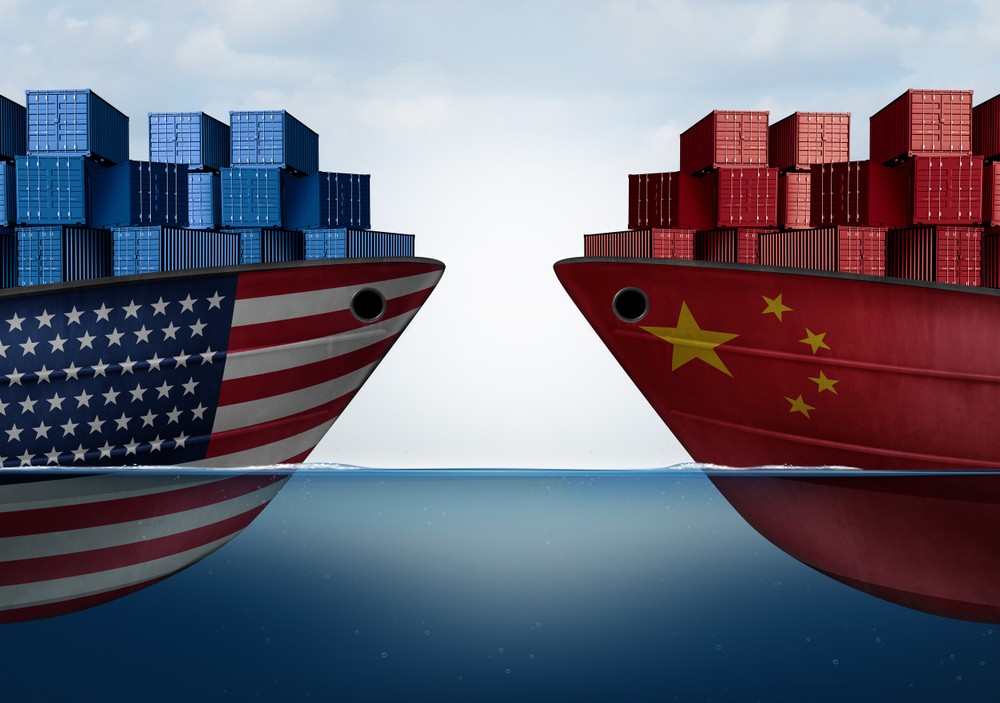China’s efforts to overcome US trade war

In the first quarter of 2019 imports to the US from the world fell by 1.9 percent. Imports from China fell much worse by 12 percent. Meanwhile, imports to China contracted by 0.5 percent in the first quarter of 2019 after a fall of 6 percent in the last quarter of 2018. (Shutterstock/-) via The Jakarta Post
JAKARTA — What appears certain today is that friction has afflicted the United States and China and the rest of the world with severe damage. In the first quarter of 2019 imports to the US from the world fell by 1.9 percent. Imports from China fell much worse by 12 percent. Meanwhile, imports to China contracted by 0.5 percent in the first quarter of 2019 after a fall of 6 percent in the last quarter of 2018. Trade has also shrunk by more than 7 percent in the case of South Korea. Even Indonesia’s exports fell by 4.3 percent and imports by 15.3 percent. These numbers are scary already.
However, possible escalation of the friction is even scarier. Some studies have suggested that in a noncooperative setting tariff rates can skyrocket to 40 percent or even higher. It is hard to imagine what would happen to the world economy if tariff rates are hiked to the range of 40 percent. Such a scenario would cost the world a huge chunk of gross domestic product. The hard-fought progress in multilateral and regional liberalization through countless rounds of negotiations will be put at stake.
Article continues after this advertisementMuch of the fruit of trade or division of labor will be lost irrespective of how one looks at it as a consumer or as a producer. The pace of technological change will surely slow down for lack of the global scale from which contemporary tech companies, particularly US companies, have greatly benefitted. The incremental prosperity that came along with the system of the General Agreement on Tariffs and Trade and later on the World Trade Organization system has shrunk gradually.
The danger of the world drifting into a noncooperative setting of global policies on trade, investment, information flows, intellectual property and movements of people may still appear somewhat remote nowadays. From continued talks between the US and China some compromises may be reached and help soften the conflict.
However, a bilateral settlement is fundamentally flawed in the current world economy of complex technologies. First, it is arduous to navigate such bilateral talks to timely success, given the tiny space afforded in such talks to trade mutual favors. Second, a bilateral trade deal involving the US is a very serious and ironic blow to the multilateral trading system. This is not the first time a WTO member has departed from the principle of unconditional nondiscrimination.
Article continues after this advertisementAlmost all countries have done so by joining regional trade agreements, but a US uncoupling from the WTO system is a very different story, although not unprecedented. Likewise, a separate US-China trade deal would imply a de facto end to nondiscrimination in world trade. It is of utmost importance that the trade, investment and intellectual property rights parts of the US-China conflict are brought back to the WTO in varied ways.
The WTO provides diverse opportunities to deal with trade issues and trade-related issues in different formats, such as a mechanism for dispute settlement in which issues can be brought with a view among others to control damage.
Indeed, the need for global solutions is increasingly being felt following deepening integration and interdependence among major economies under the deeply connected intelligent technologies of life. However unrealistic it may seem under the seeming stalemate between the US and China, keeping the WTO process alive irrespective of immediate results is in the interest of both countries and the world at large.
The arrival of China as the world’s second largest economy and obviously that of the most vibrant center of innovation and growth, call for an increasingly engaged China in the shaping of global economic affairs. It can learn, for instance, from the transition from the Europe-centered world system before the Atlantic Charter to the US-centered system. Aspiring leaders need to establish a pool of followers with shared interests. China is trying to do so, in among other ways, through the Asia Infrastructure Investment Bank and the world-encompassing One Belt One Road Initiative.
Many benefaction elements are made part and parcel of the two initiatives. However, they are widely perceived to have been, first, too China-centered and second, too stark in project dimension. Inspiring ideas on what the post-Bretton-Woods system would be like are missing.
Leveraging concessions related to trade and investment policy measures is one possible catalyst for a more comprehensive design. Bringing the level of China’s trade barriers much closer to that of the major trading economies and leveraging it as an instrument of benefaction for rediscovering multilateralism would help improve perceptions of China’s leadership role.
China’s innovative ideas on reforming the trade-related issues of investment, intellectual property, the environment, climate change and the Sustainable Development Goals of 2030, in a world heading toward technological and social disruptions, would also produce similar effects.
What China refers to as “Chinese characteristics” in policy debates should be spelled out in connection with the emerging world system, bearing in mind the interests of the wider world rather than merely China’s national interests.
Within the realm of behind-borders measures, China can promote abundant reforms such as promotion of competition, advancement of private capital’s participation in the economy, including reform of state-owned enterprises, reduction of excess capacity policy measures stipulated in the “13th five-year plan”, which would also help strengthen the positive impacts of China’s growth on the rest of the world.
Disclaimer: The opinions expressed in this article are those of the author and do not reflect the official stance of The Jakarta Post.
















